Civil engineering students face a unique set of technological demands. From running complex design software to analyzing intricate data sets, the right laptop can make or break their academic experience. Whether navigating the bustling campus or working on-site in challenging environments, portability and durability are crucial. But power and performance are equally important, as civil engineering software can be notoriously resource-intensive. So, what’s the best laptop for these aspiring engineers? Let’s delve into the ideal features and explore some top contenders that will help them build a solid foundation for their future careers.
See also: Best Laptops for Engineering Students
Civil Engineering Laptop Requirements
- Windows 10/11 (64-bit): This is the standard operating system for engineering software.
- Powerful processor: Aim for at least a quad-core processor with a clock speed of 2.4 GHz. Faster is better.
- 16GB RAM: This allows smooth multitasking and running demanding programs. 32GB is recommended for advanced tasks.
- 512GB SSD (Solid State Drive): This provides fast storage for your programs and files. 1TB is ideal.
- Dedicated graphics card: This is crucial for running 3D modeling software. Aim for at least 1GB of dedicated memory.
Best Laptops for Civil Engineering Students
- ASUS TUF Gaming A15 Gaming Laptop ($1,385)
- HP Envy 17 Laptop ($2,229)
- Dell XPS 15 9500 Laptop ($2,166)
- MSI CreatorPro M15 Laptop ($1,099)
- Lenovo ThinkPad P1 Gen 5 ($2,599)
- Acer Swift X Intel Evo Thin & Light Creator Laptop ($899)
- Microsoft Surface Laptop Studio ( $1,030)
1. ASUS TUF Gaming A15 Gaming Laptop

| Model Name | FA507XI-EH94 |
| Screen Size | 15.6 Inches |
| Color | Mecha Gray |
| Hard Disk Size | 1 TB |
| CPU Model | Ryzen 9 |
| Ram Memory Installed Size | 16 GB |
| Operating System | Windows 11 Home |
| Graphics Card Description | Dedicated |
| Graphics Coprocessor | NVIDIA GeForce RTX 4070 |
The ASUS TUF Gaming A15 offers a robust set of features that could make it a suitable choice for civil engineering students, depending on their specific needs and preferences.
- Performance: The combination of an AMD Ryzen 7 7940HS CPU and NVIDIA GeForce RTX 4070 Laptop GPU with 140W Max TGP should provide ample computing power for demanding engineering applications. The MUX Switch and Advanced Optimus technology contribute to better performance and battery optimization, which are valuable for resource-intensive tasks.
- Memory and Storage: The laptop comes with 16GB of DDR5-4800MHz memory, which should facilitate smooth multitasking. The 1TB PCIe 4×4 storage ensures quick data access and fast loading times, which can be beneficial when working with large engineering files and applications.
- Display: The FHD 144Hz display with 100% sRGB color coverage is well-suited for tasks that require accurate color representation, such as CAD work or graphic design. The adaptive sync technology enhances the visual experience, making it smoother and more enjoyable.
- Cooling System: The presence of 84-blade Arc Flow Fans is promising for effective cooling without excessive noise. This is crucial for sustained performance during extended work sessions, especially when running resource-intensive engineering software.
- Durability: The military-grade toughness, tested against drops, vibration, humidity, and extreme temperatures according to MIL-STD-810H standards, adds an extra layer of reliability. This could be beneficial for students who might be using the laptop in various environments.
- Xbox Game Pass Ultimate: While not directly related to engineering tasks, the inclusion of a free 90-day Xbox Game Pass Ultimate could provide a well-deserved break for entertainment and relaxation.
In summary, the ASUS TUF Gaming A15 appears to be a well-rounded laptop with features that cater to the needs of civil engineering students, offering a powerful performance, efficient cooling, durability, and a display suitable for professional work. However, individual preferences and specific software requirements should be considered before making a final decision.
2. HP 17 Envy Laptop
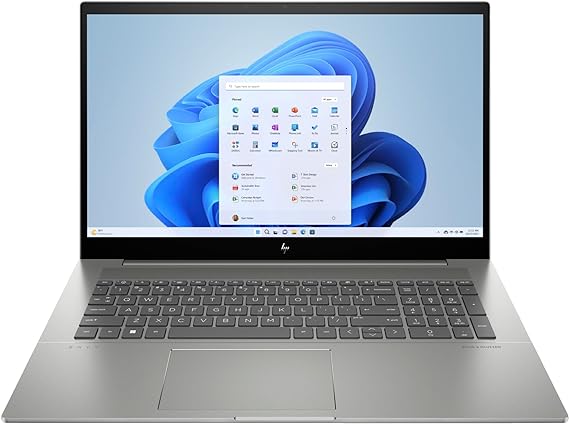
| Model Name | 17-CR100 |
| Screen Size | 17.3 Inches |
| Color | Natural Silver |
| Hard Disk Size | 4 TB |
| CPU Model | Core i7 Family |
| Ram Memory Installed Size | 64 GB |
| Operating System | Windows 11 Pro |
| Special Feature | HD Audio, Backlit Keyboard, Numeric Keypad |
| Graphics Card Description | Dedicated |
The HP Envy laptop offers impressive specifications that could make it a strong contender for civil engineering students. Here’s a breakdown of the features and how they align with the needs of civil engineering students:
- Powerful Performance: The 10-core 13th Gen Intel Core i7-1355U processor with up to 5.0 GHz and 64GB of DDR4 SDRAM provides robust computing power. This is beneficial for running resource-intensive engineering software and multitasking efficiently.
- Ample Storage: The 4TB M.2 NVMe Solid State Drive offers ample storage space, which is crucial for storing large design files, 3D models, and various engineering software applications.
- Graphics Performance: The NVIDIA GeForce RTX3050 graphics with 4GB GDDR6 is a capable GPU that can handle graphics-intensive tasks, including 3D modeling and simulations commonly used in civil engineering.
- Large, High-Quality Display: The 17.3″ FHD multitouch-enabled IPS display with 100% sRGB color gamut is excellent for detailed design work. The edge-to-edge glass and high brightness contribute to a visually immersive experience.
- Connectivity Options: The laptop offers a variety of ports, including Thunderbolt 4 Type-C, USB Type-A, HDMI 2.1, and an SD card reader. This extensive connectivity is useful for connecting external devices, displays, and transferring files.
- Windows 11 Pro: The upgrade to Windows 11 Pro provides a modern and secure operating system, and it’s likely to be compatible with the latest engineering software.
- Portability and Build Quality: The laptop’s dimensions (15.68 x 10.2 x 0.77 in) and weight (5.5 lbs) are reasonable for a 17.3″ laptop. The full alloy body adds durability, and the backlit keyboard makes it practical for working in different environments.
- Additional Features: The inclusion of Wi-Fi 6E, Bluetooth 5.3, a high-resolution camera, and Bang & Olufsen audio enhance the overall user experience.
Considering these features, the HP Envy laptop with the specified configurations appears to be a strong candidate for civil engineering students who require a powerful and versatile machine for their academic and design-related tasks.
3. Dell XPS 15 9500 Laptop
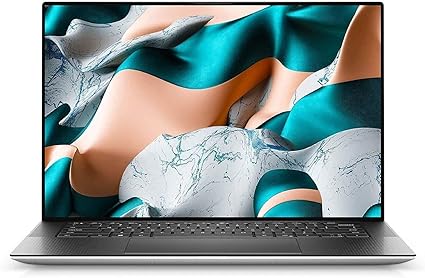
| Model Name | XPS 15 9500 |
| Screen Size | 15.6 Inches |
| Hard Disk Size | 1 TB |
| CPU Model | Intel Core i9 |
| Ram Memory Installed Size | 32 GB |
| Operating System | Windows 10 Home |
| Graphics Card Description | Dedicated |
| Graphics Coprocessor | NVIDIA GeForce GTX 1650 |
| CPU Speed | 2.4 GHz |
The Dell XPS 15 9500, offers several features that can make it a good choice for civil engineering students. Here’s a breakdown of the key features and their relevance:
- Intel Core i9-10885H Processor: The powerful 10th generation Intel Core i9 processor provides high-speed performance, making it suitable for resource-intensive tasks often encountered in civil engineering applications such as CAD (Computer-Aided Design) and other simulations.
- 15.6 Inches FHD Display: The 15.6-inch Full HD (FHD) display offers a good balance between portability and screen real estate. This is beneficial for civil engineering students who may need to work on detailed drawings, blueprints, and other design tasks.
- NVIDIA GTX 1650 Ti 4GB: The dedicated NVIDIA GTX 1650 Ti graphics card with 4GB of VRAM is a significant advantage for running graphics-intensive applications. This is particularly useful for 3D modeling, rendering, and simulations that are common in civil engineering software.
- 1TB PCIe Solid State Drive: The spacious 1TB PCIe Solid State Drive (SSD) ensures fast data access and quick boot times. This is crucial for handling large engineering project files efficiently, contributing to a smooth workflow.
- 32GB DDR4-2933MHz RAM: The ample 32GB of high-speed DDR4 RAM allows for seamless multitasking and handling of memory-intensive applications. Civil engineering software often requires a significant amount of RAM, and having 32GB will contribute to smooth performance.
- Windows 10 Home: The inclusion of Windows 10 Home provides a familiar and user-friendly operating system, compatible with a wide range of software applications commonly used in civil engineering studies.
- Build Quality and Design: Dell XPS laptops are known for their premium build quality and sleek design. The portability and durability of the XPS 15 make it suitable for students who may need to carry their laptops to classes or project sites.
- Thunderbolt 3 and USB-C Connectivity: The presence of Thunderbolt 3 and USB-C ports enhances the laptop’s connectivity options, allowing for fast data transfer and compatibility with external devices commonly used in engineering tasks.
In summary, the Dell XPS 15 9500 with the specified configuration provides a powerful combination of high-end processing capabilities, dedicated graphics, ample storage, and a quality display, making it well-suited for the demanding tasks that civil engineering students may encounter in their studies. The combination of these features should contribute to a smooth and efficient experience when running engineering software and working on design projects.
4. MSI CreatorPro M15 Laptop

| Model Name | CreatorPro M15 A11UIS-1292US |
| Screen Size | 15.6 Inches |
| Color | Black |
| Hard Disk Size | 512 GB |
| CPU Model | Core i7 |
| Ram Memory Installed Size | 16 GB |
| Operating System | Windows 11 Pro |
| Special Feature | Thin Bezel |
| Graphics Card Description | RTX A1000 Dedicated |
The MSI CreatorPro M15 Laptop appears to be a strong choice for civil engineering students due to several key features:
- Powerful Processor: The Intel Core i7-11800H 8 Core processor provides robust performance, essential for running demanding engineering software suites used in civil engineering tasks like CAD (Computer-Aided Design), BIM (Building Information Modeling), and analysis software.
- RTX A1000 Graphics: The inclusion of the RTX A1000 GPU enhances the laptop’s capability for graphic-intensive tasks such as 3D modeling, rendering, and simulation, which are commonly encountered in civil engineering projects.
- High-Resolution Display: While the display mentioned is Full HD, it still provides clear visuals for drafting designs and viewing detailed engineering drawings. However, for certain tasks, civil engineering students may prefer a higher resolution display. The QHD+ display option is especially beneficial, offering ample screen real estate and vibrant color reproduction, which can aid in design visualization and analysis.
- Portability and Durability: The thin and lightweight design of the laptop, coupled with its durable construction, makes it suitable for students who need to carry their laptops between classes, labs, and study sessions.
- Windows 11 Pro: The operating system, Windows 11 Pro, offers a user-friendly interface and enhanced productivity features that can streamline workflow and organization, contributing to the efficiency of civil engineering students.
- Flip-n-Share Feature: The ability to lay the laptop flat and its ultra-thin bezels facilitate collaborative work, making it easier for civil engineering students to share ideas, designs, and projects with classmates or colleagues.
Overall, the MSI CreatorPro M15 Laptop combines powerful performance, high-quality display options, portability, and collaborative features, making it a compelling choice for civil engineering students who require a reliable and versatile computing tool for their academic and professional endeavors.
5. Lenovo ThinkPad P1 Gen 5
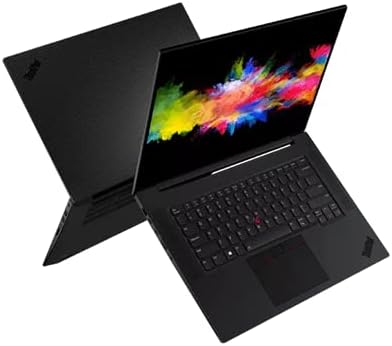
| Model Name | ThinkPad P1 Gen 5 Mobile Workstation |
| Screen Size | 16 Inches |
| Color | Black |
| CPU Model | Core i7 Family |
| Ram Memory Installed Size | 32 GB |
| Operating System | Windows 11 Pro |
| Special Feature | Backlit Keyboard |
| Graphics Card Description | Dedicated |
| Graphics Coprocessor | NVIDIA GeForce RTX 3070 Ti 8GB GDDR6 |
The Lenovo ThinkPad P1 Gen 5, with its robust specifications, is indeed an excellent choice for civil engineering students for several reasons:
- Powerful Processor: The Intel Core i7-12800H processor with 14 cores (6 performance + 8 efficiency) and 20 threads provides ample computing power for running complex engineering software suites used in civil engineering applications. Its high clock speeds and multi-core architecture ensure smooth performance even during resource-intensive tasks like simulations, modeling, and CAD work.
- Ample Memory: Equipped with 32GB of DDR5 RAM, the laptop offers plenty of memory for multitasking and handling large datasets commonly encountered in civil engineering projects. The DDR5 technology ensures faster data transfer rates, enhancing overall system responsiveness.
- Fast Storage: The 1TB PCIe NVMe SSD storage offers fast data access and retrieval speeds, crucial for storing and accessing large design files, project documents, and software applications common in civil engineering workflows. The Opal2 support ensures data security and integrity.
- High-Resolution Display: The 16.0″ WQXGA IPS display with a resolution of 2560 x 1600 and 500 nits brightness delivers crisp and clear visuals, making it suitable for detailed design work, schematic analysis, and 3D modeling tasks. The anti-glare coating reduces eye strain during extended usage periods.
- Dedicated Graphics: The NVIDIA GeForce RTX 3070 Ti with 8GB GDDR6 VRAM provides powerful graphics processing capabilities necessary for rendering complex 3D models, simulations, and visualizations commonly encountered in civil engineering software packages like AutoCAD, Revit, and Civil 3D.
- Portable Design: Despite its powerful hardware, the ThinkPad P1 Gen 5 maintains a relatively lightweight and slim profile, making it highly portable for students who need to carry it between classes, labs, and study sessions. Its compact dimensions and weight of 3.99 lbs make it easy to transport without sacrificing performance.
- Reliability and Durability: Lenovo’s ThinkPad series is known for its durability, robust build quality, and reliability. The ThinkPad P1 Gen 5 undergoes rigorous testing to ensure it can withstand the demands of daily use and the rigors of academic life, making it a dependable companion throughout a student’s civil engineering education.
Overall, the combination of powerful hardware, ample memory and storage, high-resolution display, dedicated graphics, portability, and durability makes the Lenovo ThinkPad P1 Gen 5 an excellent choice for civil engineering students seeking a reliable and capable laptop to support their academic and professional endeavors.
6. Acer Swift X Intel Evo Thin & Light Creator Laptop
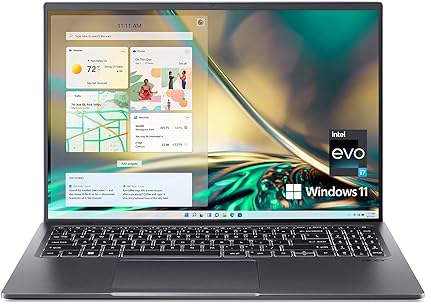
| Model Name | SFX16-52G-73U6 |
| Screen Size | 16 |
| Color | Gray |
| Hard Disk Size | 512 GB |
| CPU Model | Core i7 |
| Ram Memory Installed Size | 16 GB |
| Operating System | Windows 11 Home |
| Graphics Card Description | Dedicated |
| Graphics Coprocessor | Intel Iris Xe Graphics |
The Acer Swift X appears to be a solid choice for civil engineering students for several reasons:
- Powerful Performance: The Intel Core i7-1260P Processor with 12 cores and 16 threads, combined with 16GB of LPDDR45 memory and a 512GB PCIe Gen 4 SSD, ensures smooth multitasking and quick access to large engineering software packages.
- Graphics Capability: The Intel Arc A370M graphics card with 4GB GDDR6 memory can handle demanding CAD and 3D modeling software commonly used in civil engineering.
- High-Resolution Display: The 16.0″ WUXGA IPS LED-backlit display with 100% sRGB coverage provides sharp visuals and accurate color reproduction, essential for detailed design work.
- Connectivity Options: The laptop offers versatile connectivity options including USB Type-C ports supporting Thunderbolt 4, HDMI 2.1, and Wi-Fi 6E, ensuring seamless data transfer and connectivity to external displays and peripherals.
- Portability and Durability: With a slim design and a long-lasting battery life of up to 8.5 hours, it’s suitable for carrying between classes or working on projects on the go. Additionally, features like the backlit keyboard and fingerprint reader enhance usability and security.
- Software Compatibility: With Windows 11 Home pre-installed, it ensures compatibility with the latest software and applications commonly used in civil engineering education and practice.
Overall, the Acer Swift X offers a powerful combination of performance, portability, and connectivity, making it an excellent choice for civil engineering students who need a reliable and capable laptop to support their studies and projects.
7. Microsoft Surface Laptop Studio
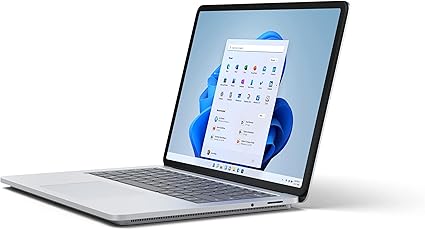
| Model Name | Surface Laptop |
| Screen Size | 12.3 Inches |
| Color | Platinum |
| Hard Disk Size | 512 GB |
| CPU Model | Intel Core i7-11700 |
| Ram Memory Installed Size | 16 GB |
| Operating System | Windows 11 Home |
| Special Feature | Backlit Keyboard |
| Graphics Card Description | NVIDIA GeForce RTX 3050 Ti Dedicated |
The Microsoft Surface Laptop Studio stands out as a strong contender for the “Best laptops for civil engineering students” due to several key features that cater to the demands of their studies and professional needs:
- Powerful Performance: Equipped with 11th Gen Intel Core H Series quad-core processors, this laptop can handle complex engineering software and multitasking efficiently. Civil engineering students often run resource-intensive applications like AutoCAD, Revit, and other simulation tools, and the Surface Laptop Studio’s powerful CPU ensures smooth performance.
- Advanced Graphics: The inclusion of the NVIDIA GeForce RTX 3050 Ti with Ampere architecture provides robust graphics capabilities, which are essential for rendering detailed 3D models and simulations. This feature is particularly beneficial for civil engineering students working on projects that require high-quality visualizations and animations.
- Versatile Design: The laptop’s boundary-pushing design allows it to transition seamlessly between a traditional laptop, an entertainment stage, and a creative canvas. This versatility is useful for civil engineering students who need to take notes during lectures, present projects, and work on detailed design tasks with ease.
- High-Quality Display: The 14.4” PixelSense Flow touch display offers uniform, true-to-life color and contrast, which is crucial for accurately viewing design and technical drawings. The high refresh rate of up to 120Hz ensures smoother scrolling and a more responsive touch experience, enhancing productivity and user experience.
- Digital Pen Support: Pairing the Surface Laptop Studio with the Surface Slim Pen 2 provides an exceptional digital pen experience, simulating the feel of pen on paper. This feature is invaluable for civil engineering students who need to annotate diagrams, sketch ideas, and take detailed handwritten notes.
- Portability and Durability: The laptop’s sleek design and lightweight build make it a portable yet powerful device, ideal for students who need to carry their laptops between classes, labs, and study sessions. Its durable construction ensures it can withstand the rigors of daily use.
- Integration with Microsoft 365: The inclusion of essential tools like Word, Excel, and PowerPoint through Microsoft 365 integration supports the academic needs of civil engineering students, enabling them to create reports, manage data, and deliver presentations effectively.
Overall, the Microsoft Surface Laptop Studio combines powerful hardware, advanced graphics, a versatile design, and essential productivity tools, making it an excellent choice for civil engineering students who require a reliable and high-performing laptop for their studies and projects.
Conclusion
In conclusion, the best laptop for a civil engineering student ultimately depends on their individual needs and budget. While powerful processors, dedicated graphics cards, and ample RAM are essential for demanding software, factors like portability, battery life, and display quality shouldn’t be overlooked. By carefully considering their priorities and researching the latest models, civil engineering students can invest in a laptop that empowers their learning and fuels their future success in the field.
FAQs
For civil engineering students, the Dell XPS 15 and Lenovo ThinkPad P Series are excellent choices. They offer strong processors, dedicated GPUs, and high-resolution displays, perfect for CAD and simulation software. Look for at least 16GB RAM and an SSD for smooth performance and faster load times.
Yes, civil engineers need a good laptop, especially one with strong processing power, ample RAM, and a dedicated GPU. These specifications are essential for running software like AutoCAD, Revit, and Civil 3D, which are resource-intensive and necessary for drafting, designing, and analyzing complex engineering projects.
Civil engineering students need a laptop with a strong processor (i5 or i7), 16GB RAM, and dedicated graphics (NVIDIA GTX or RTX) to handle CAD and simulation software. A 512GB SSD ensures faster storage, while a 15-inch Full HD display provides clarity for design work, enhancing productivity and detail.
For engineering students, a laptop with a powerful processor (Intel i7 or Ryzen 7), at least 16GB of RAM, dedicated graphics (NVIDIA GTX/RTX), and ample storage (512GB SSD or more) is ideal. Models like the Dell XPS 15, MacBook Pro 16, or Lenovo ThinkPad P-series offer great performance for engineering tasks.

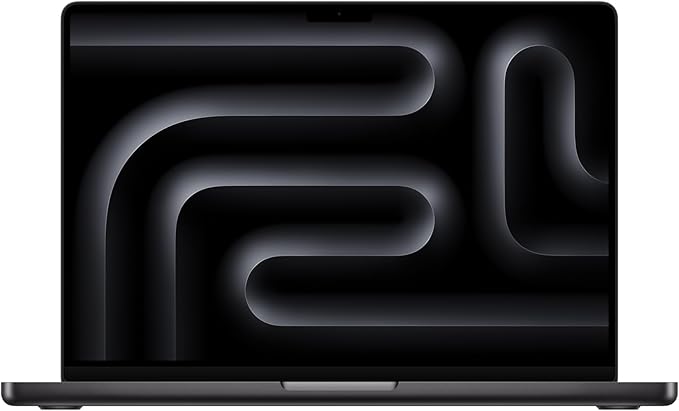










Fantastic recommendations. These laptops perfectly fit a civil engineering student’s needs. Thanks for this guide.
I found this article super informative. The laptop options are spot on for civil engineering students, covering all essential features. Thanks for such great insights.
This guide is incredibly helpful for civil engineering students. The detailed specs and recommendations make it easy to find the perfect laptop. Great resource, thanks.